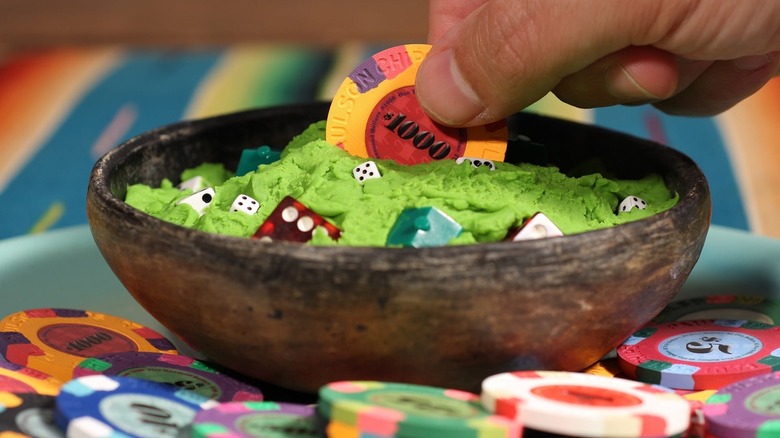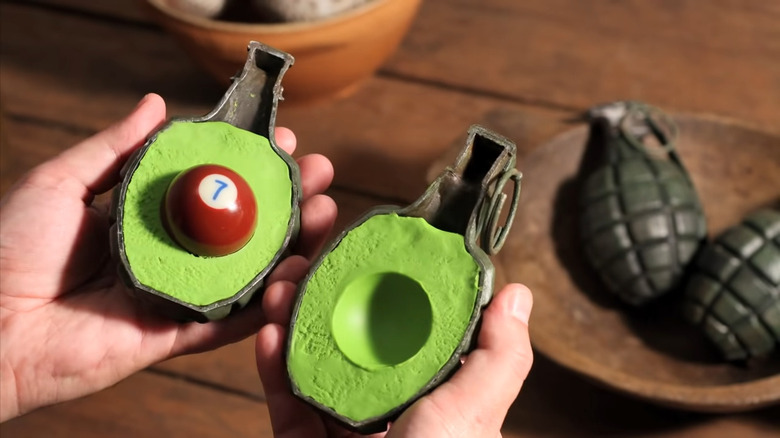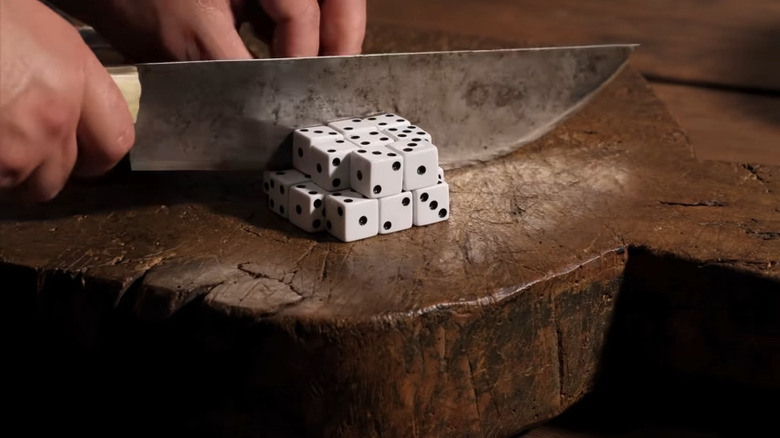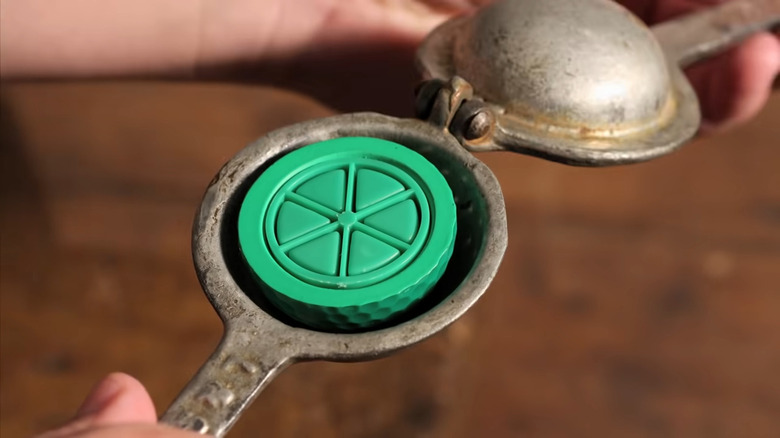How An Under-Two-Minute Film Ended Up With An Oscar Nomination
The longest film to ever be nominated for an Academy Award was Ezra Edelman's 2016 film "O.J.: Made in America." Running a whopping 467 minutes, "O.J." was presented theatrically in two chunks: one was four hours, the other was three and a half hours. More than a detailed account of O.J. Simpson and his infamous 1994 murder trial, "Made in America" sought to unpack the very nature of race and fame in the United States. It ended up winning the Academy Award for Best Documentary Feature.
Yeah, it's long. Indeed, many Oscar nominees — outside of the Shorts categories — tend to be all-day suckers. A study by the BBC found the average historic length of a Best Picture winner was 140 minutes, and the average length of the Best Picture nominees for 2021 was 139 minutes. Even the Oscar-nominated short films often skew long. Those who follow the Best Documentary Short category will notice that — in addition to being harrowing movies about, say, child soldiers or end-of-life care — the films frequently sidle right up to the Academy's 40-minute length limit for short films.
One may breathe a sign of relief, then, at the prospect of taking in an Academy Award-nominated animated short that runs a whole of 100 seconds. 2012's "Fresh Guacamole," by animator PES, is the shortest film ever nominated for an Academy Award. It may have lost that year to the six-and-a-half minute Disney film "Paperman," but it remains one of the funniest, cleverest animated shorts of the decade. And it's about nothing more than using ordinary household items to prepare the titular condiment.
Fresh Guacamole
As it is so short, and because it is available on PES' own YouTube channel, why not take a moment to watch "Fresh Guacamole" right here? Then watch it again. And look. You still haven't missed anything significant at work.
"Fresh Guacamole" employs a form of visual punmanship that has long been Pes' stock in trade. A pair of hands, photographed in stop motion, assembles the ingredients for guacamole, but only using visually similar items to the foodstuffs in question. The avocado is a hand grenade. The avocado pit is a billiard ball. The lime is a golf ball. The jalapeño pepper is a Christmas light that, when chopped, becomes miniature green Monopoly houses. And, of course, the chips are poker chips. There is a whimsical, Tex Avery-like devotion to the visual gag that makes "Fresh Guacamole" irresistible and weirdly hypnotic. One can't wait to see what the next "joke" is going to be.
PES had previously used a similar joke in his 2008 short film "Western Spaghetti," wherein stovetop flames became candy corn, bubbling water was represented by bubble wrap, and spaghetti was wooden Pick-Up Stix when uncooked and rubber bands when cooked. In 2014, PES completed a trilogy of sorts with "Submarine Sandwich," wherein a deli slicer was used to turn catcher's mitts into sliced leather gloves, boxing gloves into doilies, and soccer balls into Viewmaster reels. Pes is masterful at creating dreamlike associations between tactile, real-world food objects and the hand-sized toys and knickknacks one encounters every day. Aesthetics dictate function.
Who is PES?
PES is the screenname of animator Adam Pesapane. Born in New Jersey, PES began his animation career in 2002 with the enjoyably raunchy short "Roof Sex," wherein pieces of randy furniture engaged in the titular activity. Ever since, he has made a career of animating everyday objects standing in for other objects, including "Pee Nut" (2003), wherein a peanut and a jewelry chain stood in for urination, and "Fireworks" (2004), in which explosions were played by candy.
In 2013, PES was interviewed on the Animation World Network website, wherein he shared his inspiration for making "Fresh Guacamole" and his adoration for, in his words, "objects." "Fresh" started with one joke — hucking an avocado like it was an explosive — and expanded into 100 seconds of them. Said PES:
"Well, these ideas usually have a long gestation period. I love objects. I love thinking about objects. This is just the way I think. My films are just an expression of real thoughts that have amused me over time or that I encounter or come up with at random moments. There's usually a moment or a single idea around which I structure an entire film. An idea that I essentially fall in love with ... So as far as 'Fresh Guacamole' ... it comes back to a single idea I've always had when I walk into a food store. I see a pile of avocados. I've always had this little fantasy of grabbing one and throwing it and blowing a whole store up. So the idea of grenades as avocados is a very old idea for me. I hoarded this idea for years thinking that I could potentially use it somewhere."
And, really, who hadn't dreamed of lobbing an avocado overhand at an attacker?
Tactile inspiration
PES also pointed out that his inspiration for his food films can come from the tactile experience of handling food and how it resembles the tactile experience of handing toys and other hand-sized objects. Anyone, for instance, who has become frustrated with a Rubik's Cube likely can evoke memories of pushing on a corner with one's thumb and snapping a single cube out of place. PES certainly did, and he likened it to the experience of pushing a single garlic clove off of a bulb. He elaborated on the tactile connection:
"[I]n 'Western Spaghetti,' I did come up against a wall finding a substitute for garlic. Think how you rip off a clove of garlic with your thumb. You apply pressure to a head of garlic until it snaps [off a clove]. And I remembered when I was growing up in the '80s that's what we cheaters used to do with the Rubik's Cube. We used to apply pressure to that corner cube until it came apart and then we rearranged it. So even though a Rubik's Cube looked nothing like garlic, through that [snapping] action there is a connection. Obviously the sound effects helped to sell it as well."
It's a vivid experience for anyone who didn't solve a Rubik's Cube and also has ever prepared a garlic dish.
PES might chalk up the persistence and popularity of his films to their brevity. Easily disseminated online, memorable, and quick-to-consume, PES films are proliferated with the push of a button. In the AEW interview, he talked about always wanting to make short, re-watchable films. And he has certainly succeeded.
Brevity is the soul of wit
As one might glean from the average length of a PES short film (typically under two minutes), one will not be surprised to learn that he finds most movies to run too long. While there is no standard length for a short film, there can be, PES feels, a tendency to run one's mouth. PES' own aversion to epic lengths may have been the exact thing that garnered the Academy's attention. At only 100 seconds, "Fresh Guacamole" could be slipped into any shorts program. Its whimsical tone, also, could easily serve as a refresher after a "heavy" film, or a thematic chaser to a funny one.
'Whenever I went to film festivals, I always felt people's short films were too long. A three minute film that was one minute too long in my opinion was the equivalent of a person overstaying their welcome by one third of the time. My friends tell me I can be very, very harsh on a film ... I feel like I've got a very low tolerance for films that don't move, that are fat, that aren't cut as leanly as possible. There are films that I like, that I feel could be stronger if they were tightened by a third. Sometimes I feel the impulse to edit other people's films that I think are good.'
The Oscar nomination, PES acknowledges, was a wonderful validation for his "idea-based" method of making shorts. He doesn't want to delve into boring old tropes like story or character. A simple, enjoyable, re-watchable film is enough. In his words, there is complexity everywhere. PES coins a phrase: "[T]o make great art, you want something that appears simple to everyone but in fact is complex."



